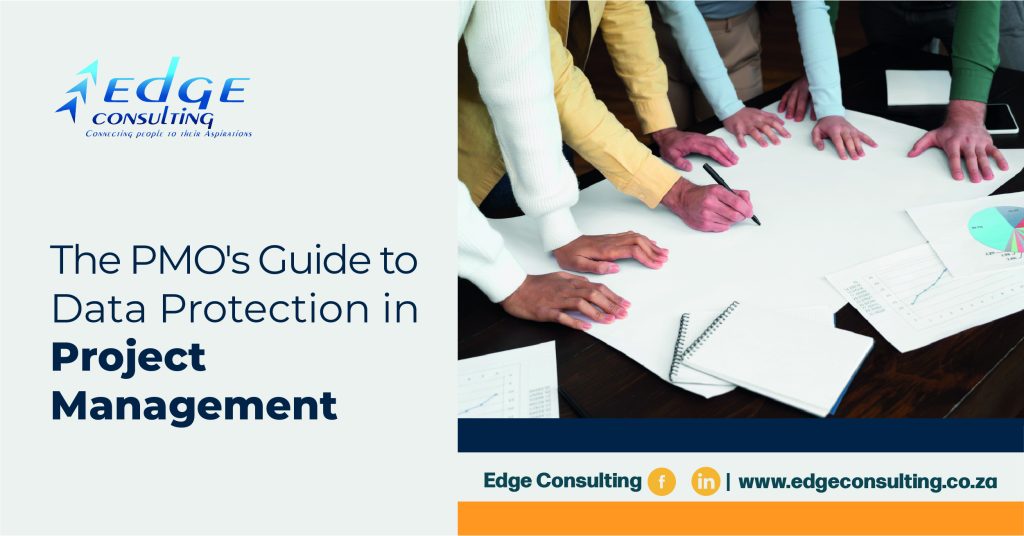
In the dynamic world of project management, especially within consulting firms like Edge Consulting, safeguarding data is paramount. As projects increasingly involve sensitive information, the Project Management Office (PMO) must establish robust data protection strategies. This guide aims to provide a comprehensive overview of essential data protection measures for PMOs in the consulting sector.
Data Classification:
– Identify and classify data based on sensitivity and importance. Categories may include public, internal, confidential, and highly confidential data.
– Develop policies for handling each category to ensure appropriate protection levels.
Risk Assessment:
– Conduct regular risk assessments to identify potential threats to data integrity, confidentiality, and availability.
– Evaluate the impact of data breaches and establish mitigation strategies.
Access Control:
– Implement role-based access control (RBAC) to ensure only authorized personnel can access sensitive data.
– Utilize multi-factor authentication (MFA) for an additional layer of security.
Encryption:
– Encrypt data at rest and in transit to protect it from unauthorized access.
– Use advanced encryption standards (AES) for robust data protection.
Secure Communication Channels:
– Employ secure communication protocols like HTTPS, SSL/TLS for data transmission.
– Regularly update and patch communication tools to address vulnerabilities.
Employee Training:
– Conduct regular training sessions to educate employees on data protection best practices and phishing awareness.
– Implement a clear data protection policy and ensure all team members understand and adhere to it.
Incident Response Plan:
-Develop a comprehensive incident response plan to quickly address data breaches or security incidents.
– Regularly test the plan through drills and simulations to ensure readiness.
Data Loss Prevention (DLP):
– Deploy DLP solutions to monitor and control data flow within the organization, preventing unauthorized sharing or leaks.
– Configure DLP tools to detect and block potential data exfiltration attempts.
Backup and Recovery:
– Implement regular backup schedules to ensure data can be restored in case of loss or corruption.
-Store backups in secure, offsite locations and regularly test recovery procedures.
Regulatory Compliance:
– Stay updated on data protection regulations relevant to your industry, such as GDPR, CCPA, and HIPAA.
– Implement necessary measures to comply with these regulations, avoiding legal penalties.
Regular Audits:
– Conduct periodic audits to evaluate the effectiveness of data protection measures.
– Use audit findings to improve and refine security policies and practices continuously.
Continuous Improvement:
– Stay abreast of emerging threats and evolving best practices in data protection.”
– Regularly update security policies and technologies to adapt to new challenges.
Vendor Management:
– Ensure third-party vendors comply with your data protection standards.
– Conduct due diligence and regular assessments of vendors’ security practices.
In project management within consulting firms like Edge Consulting, data protection is a critical responsibility of the PMO. By implementing comprehensive security measures, fostering a culture of security, leveraging advanced technologies, ensuring compliance, and continuously improving practices, the PMO can effectively safeguard sensitive data. Building a security wall around your data is not just a necessity but a strategic advantage in maintaining trust and achieving project success.
Strengthen Your Microsoft 365 Data Protection with Veeam At Edge Consulting, we understand that data is your most valuable asset. Microsoft 365 provides incredible productivity…
PMO solutions drive business efficiency and social impact. In today’s fast-evolving landscape, organizations must balance business success with social responsibility to create meaningful, sustainable impact.…
Empowering Communities Through Effective Project Management Communities thrive when impactful initiatives are executed with precision, efficiency, and sustainability. However, many well-intentioned projects fail due to…